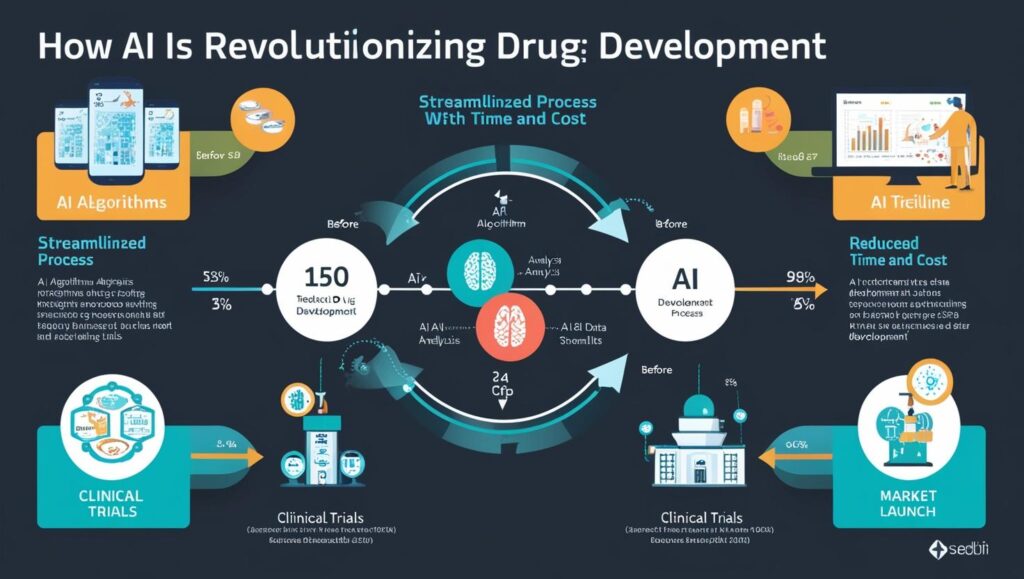
The pharmaceutical industry is on the cusp of a transformative era, driven by the integration of Artificial Intelligence (AI) into drug development. Traditionally, bringing a new drug to market has been a time-consuming and expensive process, often taking over a decade and costing billions of dollars. However, AI is poised to disrupt this paradigm by accelerating research, reducing costs, and increasing the success rate of drug discovery and development. This article explores how AI is reshaping the drug development pipeline and the potential it holds for the future of medicine.
The Challenges of Traditional Drug Development
Developing a new drug is a complex, multi-stage process that involves target identification, preclinical testing, clinical trials, and regulatory approval. Each stage is fraught with challenges:
- High Costs: The average cost of developing a new drug is estimated at $2.6 billion, with a significant portion spent on failed candidates.
- Long Timelines: The process can take 10-15 years, delaying the availability of life-saving treatments.
- High Failure Rates: Only about 10% of drug candidates that enter clinical trials ultimately gain approval, often due to lack of efficacy or safety concerns.
These challenges highlight the need for innovative approaches to streamline drug development. Enter AI, a technology capable of analyzing vast datasets, identifying patterns, and making predictions with unprecedented speed and accuracy.
How AI is Transforming Drug Development
AI is being integrated into every stage of the drug development pipeline, from target identification to clinical trials. Here’s how:
1. Accelerating Target Identification and Validation
The first step in drug development is identifying a biological target, such as a protein or gene, that plays a key role in a disease. AI algorithms can analyze vast amounts of biological and chemical data to identify potential targets more quickly and accurately than traditional methods.
For example, AI can sift through genomic data to pinpoint genetic mutations associated with diseases or use protein structure prediction tools like AlphaFold to identify druggable targets. By narrowing down the list of potential targets, AI reduces the time and cost of this critical stage.
2. Enhancing Drug Discovery
Once a target is identified, the next step is to find or design molecules that can interact with it. AI-powered platforms can analyze chemical databases to predict which molecules are likely to bind to the target and have the desired therapeutic effect.
Machine learning models can also generate novel drug-like molecules, a process known as de novo drug design. This approach not only speeds up the discovery process but also increases the likelihood of finding effective candidates. For instance, AI-driven companies like Insilico Medicine and Atomwise have successfully identified promising drug candidates in record time.
3. Optimizing Preclinical Testing
Before a drug candidate enters clinical trials, it undergoes extensive preclinical testing to assess its safety and efficacy. AI can streamline this process by predicting potential toxicity and side effects based on chemical structure and biological data.
By identifying high-risk candidates early, AI reduces the number of compounds that fail in later stages, saving time and resources. Additionally, AI can optimize experimental designs, ensuring that preclinical studies yield the most informative results.
4. Revolutionizing Clinical Trials
Clinical trials are the most expensive and time-consuming phase of drug development. AI is addressing several challenges in this area:
- Patient Recruitment: AI can analyze electronic health records (EHRs) and genetic data to identify suitable candidates for clinical trials, speeding up recruitment and ensuring a more diverse participant pool.
- Trial Design: AI can optimize trial protocols by predicting the most effective dosages, treatment durations, and patient subgroups, increasing the likelihood of success.
- Real-Time Monitoring: AI-powered tools can monitor trial participants in real time, detecting adverse events early and ensuring compliance with protocols.
5. Predicting Drug Repurposing Opportunities
AI is also being used to identify existing drugs that could be repurposed for new indications. By analyzing data from clinical trials, scientific literature, and real-world evidence, AI can uncover hidden connections between drugs and diseases.
For example, AI identified baricitinib, a drug originally developed for rheumatoid arthritis, as a potential treatment for COVID-19. This approach not only accelerates the availability of treatments but also reduces development costs by leveraging existing safety and efficacy data.
The Impact of AI on Time and Cost
The integration of AI into drug development has the potential to significantly reduce both the time and cost of bringing new drugs to market:
- Time Savings: AI can shorten the drug discovery phase from 5-6 years to 1-2 years and reduce the overall development timeline by several years.
- Cost Reduction: By improving the efficiency of each stage and reducing failure rates, AI can cut development costs by up to 30-50%.
- Increased Success Rates: AI’s ability to predict efficacy and safety early in the process increases the likelihood of successful clinical trials, further reducing costs.
Challenges and Future Directions
While the potential of AI in drug development is immense, several challenges must be addressed to fully realize its benefits:
- Data Quality and Accessibility: AI models require high-quality, standardized data to make accurate predictions. Ensuring access to diverse and comprehensive datasets is critical.
- Regulatory Hurdles: Regulatory agencies must adapt to the use of AI in drug development, establishing guidelines for the validation and approval of AI-driven processes.
- Ethical Considerations: The use of AI raises ethical questions, such as ensuring transparency, avoiding bias, and protecting patient privacy.
Looking ahead, the continued advancement of AI technologies, coupled with collaboration between industry, academia, and regulators, will be key to unlocking the full potential of AI in drug development.
Conclusion
AI is revolutionizing drug development, offering a faster, cheaper, and more efficient pathway to bringing new treatments to patients. By accelerating target identification, enhancing drug discovery, optimizing preclinical testing, and revolutionizing clinical trials, AI is addressing some of the most pressing challenges in the pharmaceutical industry.
As we move forward, it is essential to address the challenges associated with AI adoption and ensure that this transformative technology is used responsibly and ethically. With the right approach, AI has the potential to usher in a new era of innovation in medicine, delivering life-saving treatments to patients faster and more affordably than ever before.
The future of drug development is here, and it is powered by AI.
